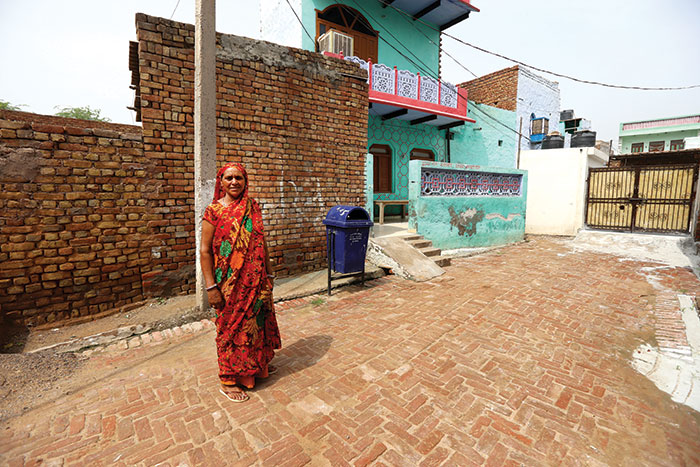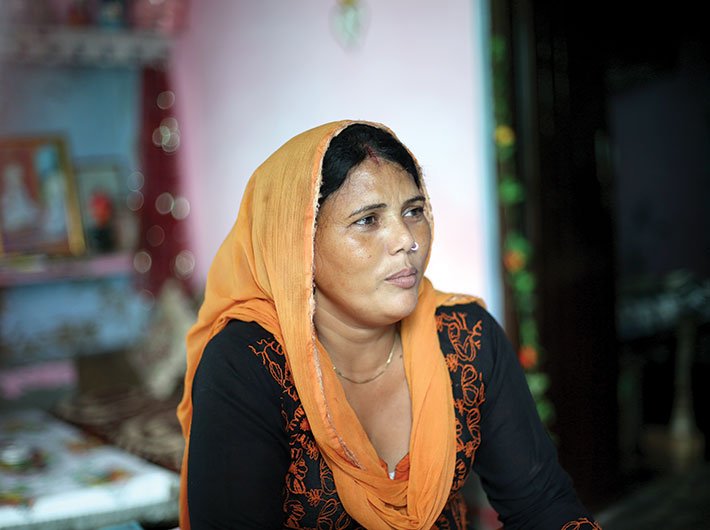Women were the agents of change who made Hirmathla, a village in Haryana’s Mewat region, free of open defecation. And this was much before Toilet: Ek Prem Katha
A quiet Arab spring led by the veiled womenfolk of Hirmathla is behind making this village in Nuh district, and for that matter, nearly all of Haryana an open defecation free (ODF) zone. Women who for generations and till recently had to cringe in shame, put up with mental agony and physical pain to deal with something as natural as the process of expelling undigested matter are now in the forefront to maintain the ODF status of the village. The difference, however, is that the revolution in Hirmathla happened much before prime minister Narendra Modi initiated the Swachh Bharat Mission (SBM).
One of the prime movers of the villagers’ initiative is Vijay Laxmi, 39, a mother of three, who dons the mantle of safai volunteer in the village, just 50 km from Millennium City Gurugram, where MNCs and the world’s best businesses have set up shop. The village – and indeed the entire Mewat region, including the district and parts of Rajasthan and western UP – is in stark contrast from Gurugram of glass-and-concrete high-rises, malls, pubs and posh bars. Here, as Vijay Laxmi says, “Some families still try to save water and make their children defecate in the drain or out in the open.” As a volunteer, she tries to prevent that. “After a lot of suffering, our surroundings have become clean. We can’t afford to become complacent about this and hence I keep a close watch,” she says. She keeps a lookout for ODF violators, persuades them to use toilets, and at times offers them a couple of pails of water from her own tank for flushing the latrine.
Vijay Laxmi’s story is at the heart of Hirmathla’s quiet toilet revolution, which happened much before the Swachh Bharat Mission had offered to provide toilets to all Indians. She was born in a village near Bharatpur in Rajasthan, where her father was a lecturer at a higher secondary school. As there was no girls-school beyond Class 8 in her village then, her parents decided to marry her off when she was 14.
All her life, she had been used to having a toilet at home. But when she came to Hirmathla, 25 years ago as a child bride, she was shocked to see that her new home did not have a toilet. “I had no idea how I would live my entire life here,” she recalls. In fact, back then, none of the 140 households in Hirmathla had toilets. As a coy bride, she often wondered how different life in her village and Hirmathla was despite the two not being located too far. Everyone in Hirmathla defecated out in the open, in the fields; women went out before sunrise or after sunset. The 14-year-old Vijay Laxmi found it repulsive; she didn’t want to live through the shameful experience every day of her life.
Like the lead protagonist in the popular Bollywood movie on the issue of problem of open defecation, Toilet: Ek Prem Katha, Vijay Laxmi admitted she always wanted to prolong her sojourns to her parents’ home so that she could avoid having to go to defecate in the fields at night in Hirmathla. Her tentative demands for building a toilet at home evoked laughter and ridicule. Her well-meaning husband, Sansar Chand, even thought of her as a demanding spouse. When she suggested her father to put in a word, he sympathised with her and yet told her she should get used to living like the others there. “Girls are supposed to adapt to the ways of their husbands’ homes,” Vijay Laxmi recalls her father saying. When she tried to coax her husband, who worked in an office in Sohna, to build a toilet, he was amused and thought she was throwing tantrums. After all, no one in the village had ever complained about relieving themselves under the skies! “Perhaps I should have been more assertive,” she now wonders.
But Vijay Laxmi’s life was to take a turn for the better soon – when she was pregnant with her first child. As the pregnancy advanced, she would get more uncomfortable walking long distances to defecate in the open. One day, while she was squatting in a field in the early hours, a village elder passed by. She felt so ashamed that she rushed home in a huff without finishing; so shocked was she that she didn’t pass stools for 25 days. The boy she delivered was born with an abnormally large head and frail limbs. Doctors said the child may have suffered because of her induced constipation: a situation where the mind tricks the body into feeling it does not need to defecate. The family was crestfallen: had they had a toilet, perhaps the child would have been born healthy. Still, it took a year for Sansar Chand to build a toilet. Theirs became the only house with a flush latrine.
“It took years of medication and visits to doctors before our son finally recovered,” recalls Vijay Laxmi, who later gave birth to two girls. Her son today works in a bank and daughters are undergraduate students at the government college, Nuh.
Vijay Laxmi’s neighbour Poonam is the pradhan (village head) and the first rebel against open defecation. Hailed as a revolutionary for her extraordinary courage in sending an ultimatum to her husband’s family to build a toilet or lose her forever, Poonam has become a role model for women in the village.
Shakuntala, her mother-in-law, who used to accompany Poonam for the midnight and post-midnight outings to the outskirts of the village, says, “Sometimes, I would also take her to Vijay Laxmi’s toilet. However, I could see she was uneasy and upset.” One day, when she went to visit her parents, Poonam took a hard decision: she would go back to her matrimonial home only after they build a toilet. Shakuntala says this put the family in a great dilemma: how could we have tulsi (considered holy) and the toilet (considered impure) in the same compound. This belief has held back many people from building toilets inside their houses and given rise to open defecation for centuries. Finally, the family had to relent. Now, women in the village openly speak of their ordeal – slipping in the muddy fields and suffering fractures and injuries, being heckled and shamed by young boys riding by on motorbikes, being bitten by snakes and scorpions.
Six years ago, Naseem Ahmed from NGO Sulabh International Service Organisation had landed in the village to check the feasibility of building toilets for all. His organisation has taken up the responsibility of making 175 villages in the state open defecation free. Interestingly, though Naseem found that villagers were aware of the advantages of having a toilet in each home, they were reluctant to make the change. “My job wasn’t easy,” says Naseem, sitting in a small office in the village.
Having known their stories, he first approached Poonam and Vijay Laxmi for help; they were willing to spread the word about cleanliness and became brand ambassadors of cleanliness. Of the first four toilets Sulabh built, three were for women. “While I was doing the base survey in the village, I found that for women, going out for defecation was part of their multitasking routine and therefore difficult; while men combined it with their morning walk and would just sit anywhere. If a woman returned home late, she would be scolded and suspected of having an affair – overall it was a very male-dominated environment and women were suffering.”
As we walk through the clean-paved streets of Hirmathla with Poonam and Vijaya Laxmi – both covering their faces to show respect to the menfolk in the village – they talk about how building toilets has brought izzat (honour) for women too.
Naseem said the villagers were keenly observing the four families that had built toilets. “They saw a marked change in their lifestyles – children would reach school in time; womenfolk looked happy and confident. Soon, the word spread and everyone wanted a toilet. The NGO built toilets for all by 2014 but continues to stay put in the village. “The challenge lies in inculcating the habit of toilet-going among the people and bringing in a permanent behavioural change among the people,” says Naseem. Sulabh maintains toilets for one year after constructing these. “If we leave it to the villagers, half of the toilets would be abandoned in case there is a problem.”

The lanes of Hirmathla are clean and sans garbage
As we came after meeting Bimla, who is an ASHA (accredited social health activist) and knowing that common ailments like loose motion and jaundice had come down by half ever since toilets were built in the village, we have almost started believing the Hirmathla model is ideal for making India open defecation free until we meet three angry young men. They are sitting in the middle of the village square – a paved place at the confluence of streets. On inquiry they say that they were waiting for the water tanker so that they could get water and take bath. “It’s my off day and I will waste it waiting for the water,” says Jamaludin, who works as a driver in a private company in Gurugram. He believes that keeping village clean is impossible unless a regular water supply is ensured. “What is the point of women learning skills and giving speeches in Delhi – his allusion is to village women attending leadership training programmes in Sulabh’s central office – if they can’t get us water,” he says angrily.
Everyone admits that the acute shortage of water in Hirmathla poses a serious challenge to keeping the village clean and maintaining its ODF status. Vijay Laxmi says most villagers of means survive on water tankers supplied by private players for Rs 700 each. Each family has to build an underground storage tank costing in the range of Rs 30,000-50,000. “In winter, one or two tankers are sufficient for a normal family but in summer, large families have to purchase even three to four tankers,” Vijay Laxmi says. Surely not many can afford this.
Sarpanch Poonam in front of the toilet inside her house
At the panchayat meeting, sarpanch Poonam attends with her face covered in a dupatta and her mother-in-law in tow to act as her spokesperson, literally..
She tells me that being a daughter-in-law, she is not supposed to speak before the village elders. So the two women have devised a plan; at the meeting, Poonam conveys her decisions to her mother-in-law, Jaishri, who in turn, speaks up for her. At one such meeting, the villagers confronted Poonam on water shortage. She had already written to the government and asked for laying a water pipe to the village. “First, it was cleanliness and now getting water to the village is my top priority,” she says.
Naseem says NGOs cannot bring water to the village. “Even if we are prepared to help the villages, we are not authorised to do it.” He worries that if the water crisis is not addressed, the ODF plans may get off track.
(The story appears in the September 1-15, 2017 issue of Governance Now)

